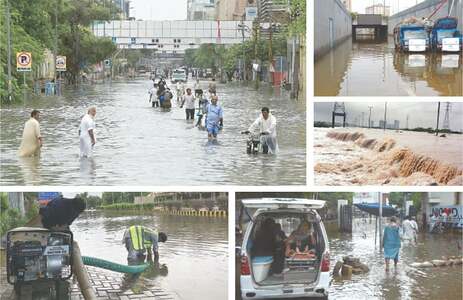• Senate committee told provinces lack capacity to deal with climate change
• GLOF inundates houses, leaves 12 families homeless in Nagar
• Downpour in Quetta causes flooding in low-lying areas
ISLAMABAD / QUETTA / GILGIT: The Pakistan Meteorological Department (PMD) on Thursday said that monsoon season has not yet subsided and a fresh spell of heavy rain would hit the country in August.
According to the forecast, heavy rain is expected in most parts of Balochistan, Sindh, Khyber Pakhtunkhwa, south Punjab, Azad Kashmir and Gilgit-Baltistan, APP reported.
Heavy rain might generate urban flooding in Karachi, Thatta, Badin, Hyderabad, Dadu, Jamshoro, Sukkur, Larkana, Shaheed Benazirabad and Mirpurkhas from Aug 11 to 13, the warning added.
Read: Karachi's crumbling infrastructure has made rain a bane for its residents
“Flash flooding is expected in Qila Saifullah, Loralai, Barkhan, Kohlu, Mosakhel, Sherani, Sibbi, Bolan, Kalat, Khuzdar, Lasbella, Awaran, Turbat, Panjgur, Pasni, Jiwani, Kohat, Swabi, Nowshera, Mardan, Peshawar, Karak, Bannu, Tank and Waziristan.”
Hot and humid weather is expected in most Punjab districts. However, rain is expected in Bhakkar, Layyah, Sahiwal, Bahawalnagar, Bahawalpur, Dera Ghazi Khan, Multan and Rahim Yar Khan.
Rainfall may trigger landslides in Kashmir, KP and GB, warned the PMD.
Separately, the Met department in a meeting of the Senate’s Standing Committee on Climate Change, cautioned that the entire country will receive above normal rainfall this season.
The committee which met with Senator Seemi Ezdi in the chair at Parliament Lodges, was also briefed by the National Disaster Management Authority (NDMA) chairman on threat of flash floods and urban flooding.
Minister for Climate Change Sherry Rehman said these events would become a regular feature and the country’s overall infrastructure was not ready for such disasters, which would lead to a severe humanitarian crisis.
The minister added that despite clear warnings from the Met department, provincial governments lacked the capacity for relief and rescue.
However, Ministry for Climate Change secretary Asif Hyder Shah also argued that the Met department couldn’t predict weather pattern in certain areas “due to lack of modern equipment”.
The committee unanimously agreed that a National Action Plan was needed and legislation should be formulated to prepare for the effects of climate change.
The NDMA chairman told the committee that the Authority has undertaken 11, 639 rescue activities, while 78 relief camps were set up accommodating 23, 061 people affected by floods.
The committee was told that since June, 575 deaths — 176 in Balochistan, 127 in Sindh and 119 Punjab — had occurred in rain-related accidents, while 939 people were injured.
GLOF causes flooding in Nagar
A glacial lake outburst flooding (GLOF) resulted in a disaster in Hoper nullah in Gilgit Baltistan’s Nagar district, leaving many people homeless. Flood water entered homes and damaged several acres of crops while several trees and a bridge were swept away by gushing water. Abid Hussain, a resident of Shaman area told Dawn that flooding in Hoper nullah has damaged many homes, leaving at least 12 families homeless.
Editorial: Monsoon misery
It has also damaged cultivated crops which were the only source of income for the locals, he added.
Another resident Muhammad Hussein told Dawn that flooding in Hoper nullah has damaged every irrigation and water channel in the valley.
Thousands of local, who depended on water from the nullah for irrigation and drinking, were now facing water shortage, he added.
Fearing heavy flooding in downstream areas, locals said safety was their biggest concern and criticised the government and NGOs for ignoring the area.
Yaqoob Ali, a social worker said many organisations like GLOF project spend money on mitigating the impact of melting glaciers, but no organisation has yet responded to the suffering of people in the valley.
Nagar Deputy Commissioner Zaid Ahmed told Dawn that more than ten families in Shaman Village have been moved to tents, while machinery and relief items have been sent to the area.
He added that the local administration was monitoring the situation, and efforts were underway to protect lives and properties of people in downstream areas.
Mr Ahmed said that the work to restore irrigation channels and communication systems was underway.
The damage assessment will start once the water level in the nullah began subsiding, he added.
More rains in Balochistan
A renewed spell of monsoon rains lashed parts of northern, central and southern Balochistan on Thursday.
Officials said that intermittent rain continued throughout the day in Chaman, Qila Saifullah, Qila Abdullah, Pishin, Ziarat, Harnai, Loralai, Barkhan, Zhob, Sibi, Nasirabad, Noshki, Toba Achakzai, Mastung, Kalat, Khuzdar, Surab, Bolan, Sanjavi, Makhtar and Lasbela districts.
Quetta also received heavy downpour in the afternoon for two hours with strong winds, resulting in a flood-like situation in low lying areas. The roads were submerged, while rainwater entered homes in these areas.
Editorial: PM’s concern, anguish and promises seem too little too late for flood-hit Balochistan
Rescue officials and teams from Quetta Metropolitan Corporation immediately started rescue operations in these areas.
Although some mud houses were damaged, no loss of life was reported in the provincial capital, official sources told Dawn.
The Provincial Disaster Management Authority (PDMA) has already issued a flood warning in nullahs and seasonal rivers after another spell of torrential rains was forecast by the Met department.
District administrations have been asked to shift people from areas close to nullahs and rivers.
Published in Dawn, August 12th, 2022












































